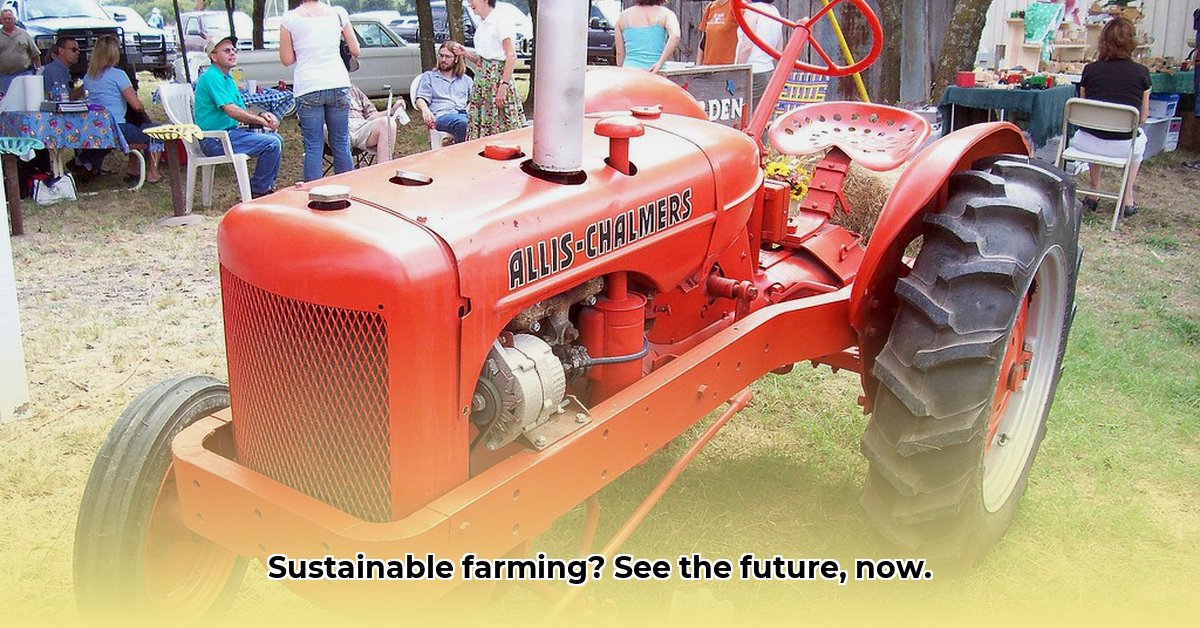
The Temple Tractor Show, far from a mere display of gleaming machinery, served as a powerful testament to agriculture's innovative drive toward sustainability. This year's event buzzed with energy, showcasing cutting-edge technologies and time-honored farming practices working in concert to transform the industry. From sleek electric tractors to ingenious water-saving irrigation, the show offered a compelling glimpse into agriculture's sustainable future. For more on sustainable gardening, check out this helpful resource on raised garden beds.
Precision Farming: Farming Smarter, Not Harder
Precision farming, a major highlight of the show, represents a paradigm shift in agricultural practices. Imagine tractors guided by GPS, planting seeds only where needed and applying fertilizer with pinpoint accuracy. This isn't science fiction; it's the reality for many modern farmers. The benefits extend beyond neatness; precision farming drastically improves efficiency. Exhibitors reported fertilizer use reductions of up to 20%, resulting in significant cost savings and a smaller environmental footprint. Drones, capable of analyzing crop health in real-time, further enhance this efficiency, allowing for prompt intervention and maximizing yields. This innovative approach offers a compelling blend of economic benefits and environmental responsibility. How can your farm benefit from precision farming techniques?
Water-Wise Solutions: Innovative Irrigation for a Thirsty World
Water scarcity poses a significant threat to global agriculture, a challenge directly addressed at the Temple Tractor Show. Numerous exhibitors demonstrated innovative irrigation techniques designed to conserve this precious resource. Drip irrigation, for instance, delivers water directly to plant roots, significantly reducing evaporation and runoff. Other systems employ sophisticated sensors to monitor soil moisture, ensuring crops receive only the necessary water, at the precise time. "We used to rely on flood irrigation," commented Sarah Miller of Miller Family Farms, "but with drip irrigation, we've seen a 30% reduction in water usage without impacting yields." Such advancements demonstrate that efficient water management is no longer optional; it's essential for future farming success.
Renewable Energy: Powering a Sustainable Agricultural Revolution
The future of farming is powered by renewable energy. The Temple Tractor Show showcased several companies offering innovative solutions for farms. Solar panels are gaining prominence, providing a cleaner and more cost-effective way to power farm operations, even offsetting the energy demands of irrigation or farm buildings. The rising popularity of electric tractors is another key development, reducing emissions and fossil fuel reliance. While challenges remain, such as battery longevity and charging infrastructure, the transition to electric farming equipment is undeniably gaining momentum. This signals a future where farms act not only as food producers but also as important contributors to a cleaner energy landscape. What role could renewable energy play in your farm's sustainability strategy?
Sustainable Practices: Beyond the Technology
Technology alone doesn't guarantee sustainability. The Temple Tractor Show highlighted the crucial role of traditional sustainable farming methods. Impressive displays demonstrated the benefits of crop rotation, cover cropping, and integrated pest management. These methods enhance soil health, reduce erosion, promote biodiversity, and minimize reliance on harmful pesticides. One exhibitor emphasized that cover crops, by enriching soil and improving structure, can boost yields by 15-20% over time. The show underscored the synergy between innovative technology and tried-and-true practices, forming a holistic approach to sustainable agriculture.
Actionable Steps Towards a Greener Farm
The Temple Tractor Show provided a clear roadmap for farmers seeking to improve sustainability on their farms:
Invest in Precision Technology: Explore GPS-guided machinery and precision tools to reduce waste and increase efficiency. This can lead to higher profits and reduced environmental impact.
Implement Water-Efficient Irrigation: Adopt drip irrigation or other water-saving methods to conserve water and reduce costs – a crucial step in mitigating drought risks.
Embrace Renewable Energy Sources: Transition to solar or wind power to reduce reliance on fossil fuels, lowering energy costs and carbon footprint.
Adopt Sustainable Farming Practices: Integrate crop rotation, cover cropping, and integrated pest management for improved soil health, reduced erosion, and enhanced biodiversity.
The Temple Tractor Show demonstrated that innovation and environmental responsibility are not mutually exclusive. It underscored the vital link between agricultural sustainability and a secure food future for all.